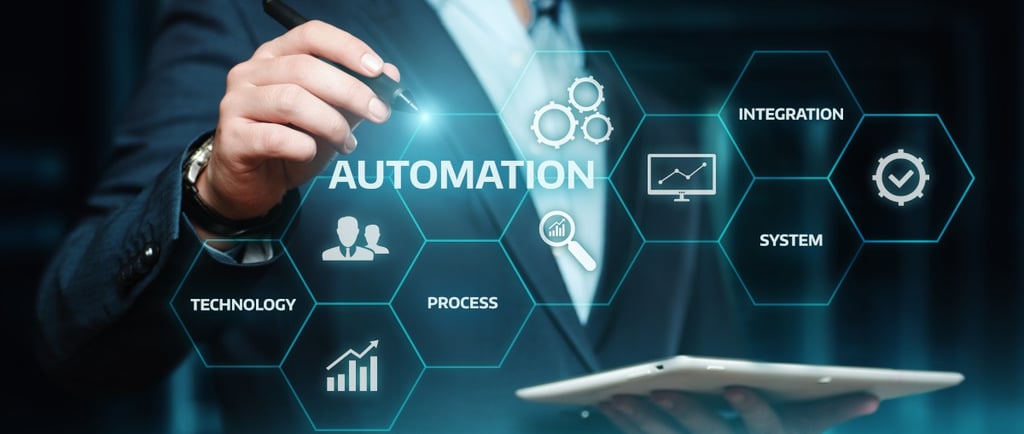The Evolution of Accounting
Embracing Ai for your client base and future clients.
George Johnson
7/20/20245 min read


The Evolution of Accounting: Embracing Ai for a Future-Ready Industry
After years confined to research labs, artificial intelligence (Ai) is now ready to transform numerous sectors that generate substantial data. Industries such as technology, finance, communications, energy, healthcare, mobility, and manufacturing are at the forefront of this revolution. Among these, accounting stands out as a field that has not experienced significant innovation since the development of double-entry bookkeeping over 500 years ago—a system that records profits and losses, is regarded as one of the greatest advancements in business history.
A Legacy of Tradition in Accounting
Accounting has long been rooted in tradition. The double-entry bookkeeping system, introduced in the late 15th century, established the framework for modern financial accounting. This method, which involves recording each transaction in two accounts, has provided a reliable system for tracking financial activities. Despite its effectiveness, the core processes of accounting have remained largely unchanged for centuries, leading to a resistance to innovation within the industry.
Ai's Arrival in Accounting
Fortunately, this long-standing tradition is witnessing a breakthrough. The integration of Ai and machine learning technologies into bookkeeping is transitioning from a distant possibility to an emerging reality. Prominent accounting software providers like Intuit, OneUp, Sage, and Xero are already incorporating advanced features that automate data entry, reconciliations, and other repetitive tasks. These advancements signify the beginning of a profound transformation in the industry.
Forecasting the Future of Accounting
Our upcoming research report on the future of accounting projects that by 2020, various accounting tasks—including tax preparation, payroll management, audits, and banking—will be fully automated through Ai-based technologies. This wave of automation is expected to disrupt the accounting industry in unprecedented ways, presenting both significant opportunities and substantial challenges.
Accountants in an Ai-Driven Era
One of the most significant concerns among accountants is the potential job displacement brought about by Ai. Stephanie Weil, CEO of Accounteam, a Silicon Valley-based accounting firm, addresses these fears. “Having machines perform these tedious and repetitive tasks might seem intimidating to many accountants because they are time-consuming and, therefore, quite lucrative,” she explains. However, Weil emphasizes that a well-configured AI system can significantly reduce accounting errors, which are typically hard to detect. This reduction in errors not only minimizes liability but also frees accountants to assume more advisory roles, enhancing the value they provide to their clients.
Evaluating Ai-Enabled Accounting Platforms
Our upcoming research study delves deeper into the automation capabilities of four popular Ai-enabled cloud accounting solutions: OneUp, QuickBooks Online, SageOne, and Xero. We assess these platforms using our proprietary Accounting Automation Index (AAI), which measures the accuracy of their Ai engines in automatically recognizing transactions from bank feeds and generating correct accounting entries without user intervention. This evaluation aims to provide a comprehensive understanding of how effectively these solutions can transform traditional accounting practices.
Historical Context of Accounting Innovations
To appreciate the significance of Ai in accounting, it's essential to understand the historical context of accounting innovations. Double-entry bookkeeping, introduced by Luca Pacioli in 1494, revolutionized the way businesses managed their finances. This system's durability over centuries underscores its fundamental importance. However, it also highlights the industry's resistance to change. Innovations have been incremental rather than transformative—until now.
Shifting from Manual to Automated Processes
The transition from manual to automated accounting processes represents a paradigm shift for the industry. Traditional accounting involves numerous repetitive tasks, such as data entry, transaction reconciliation, and financial reporting. These tasks are not only time-consuming but also prone to human error. Ai and machine learning algorithms can handle these processes with greater speed and accuracy, reducing the likelihood of errors and increasing efficiency.
Benefits of Ai Integration in Accounting
The benefits of integrating AI into accounting are manifold. Firstly, the automation of routine tasks allows accountants to focus on more strategic and value-added activities, such as financial analysis and advisory services. This shift can enhance the role of accountants as trusted business advisors, providing insights that drive decision-making and business growth.
Secondly, Ai can significantly reduce the risk of errors. Manual data entry and reconciliation are susceptible to mistakes that can have far-reaching consequences. Ai systems, on the other hand, can process vast amounts of data with high accuracy, ensuring that financial records are precise and reliable.
Addressing Challenges and Concerns
Despite its potential benefits, the adoption of Ai in accounting is not without challenges. One major concern is the fear of job displacement. As Ai takes over routine tasks, there is a legitimate concern that some accounting jobs may become obsolete. However, it's important to note that Ai is not intended to replace accountants but to augment their capabilities. By automating mundane tasks, Ai frees up accountants to engage in more meaningful and impactful work.
Another challenge is the need for accountants to adapt to new technologies. This shift requires a change in mindset and the acquisition of new skills. Accountants must become proficient in using Ai-enabled tools and understand how to leverage these technologies to enhance their work.
Evolution of Ai Technologies in Accounting
Ai technologies in accounting are evolving rapidly. Machine learning algorithms are becoming increasingly sophisticated, enabling them to handle complex accounting tasks with minimal human intervention. Natural language processing (NLP) capabilities allow Ai systems to understand and interpret unstructured data, such as emails and invoices, further streamlining accounting processes.
Real-World Applications of Ai in Accounting
To illustrate the impact of Ai in accounting, let's consider a few real-world applications. OneUp, a cloud-based accounting software, uses Ai to automate data entry and transaction categorization. This automation saves time and reduces the likelihood of errors, allowing businesses to maintain accurate financial records effortlessly.
Similarly, QuickBooks Online leverages Ai to streamline expense tracking and invoicing. The platform's Ai engine can automatically categorize expenses based on historical data, making it easier for businesses to track their spending and manage their finances.
SageOne, another leading accounting software, uses Ai to simplify bank reconciliations. The platform can match transactions from bank feeds with corresponding entries in the accounting system, ensuring that financial records are always up-to-date and accurate.
Xero, a popular accounting solution, uses Ai to enhance financial reporting. The platform's Ai engine can analyze financial data and generate insightful reports that help businesses make informed decisions.
Preparing for the Ai-Driven Future
Looking ahead, the future of accounting is bright with the integration of Ai. As Ai technologies continue to advance, their capabilities will expand, enabling them to handle even more complex accounting tasks. This evolution will drive further efficiency and accuracy in financial management, transforming the accounting profession.
To prepare for this Ai-driven future, accountants must embrace change and proactively seek opportunities to learn and adapt. Continuous professional development is essential to stay abreast of technological advancements and understand how to leverage Ai to enhance their work. By doing so, accountants can position themselves as indispensable assets to their organizations, providing strategic insights that drive business success.
The integration of Ai in accounting represents a monumental leap forward for the industry. After centuries of relying on traditional methods, accounting is poised for a revolution that will transform how financial activities are managed. While the transition may present challenges, the benefits of Ai—improved efficiency, reduced errors, and enhanced strategic capabilities—are undeniable. By embracing Ai and adapting to new technologies, accountants can elevate their profession and play a crucial role in the future of business and commerce.
In closing, Ai's journey from research labs to practical applications in accounting is a testament to its transformative potential. As Ai continues to evolve, its impact on accounting will only grow, ushering in a new era of innovation and efficiency. Embracing the future of accounting is here, and it is powered by Ai. Is it time for you to take hold?


